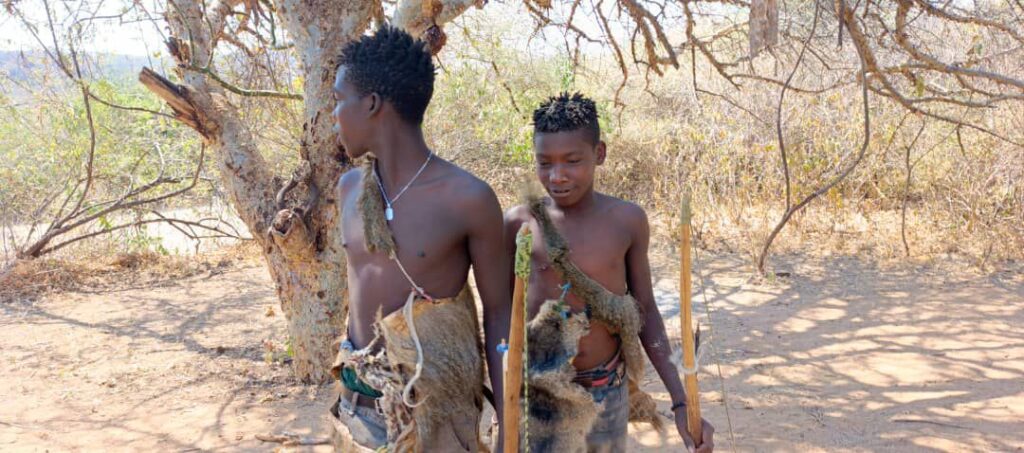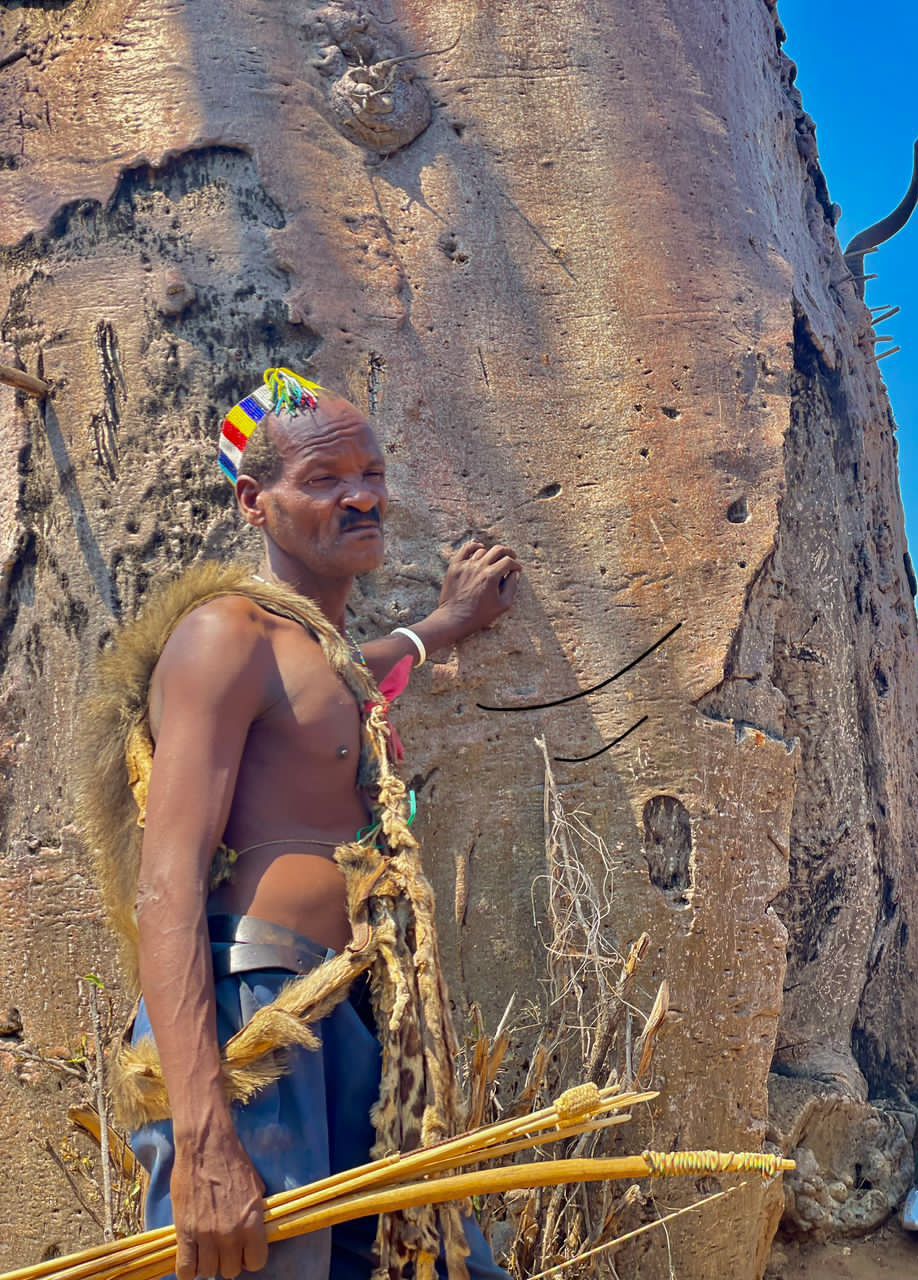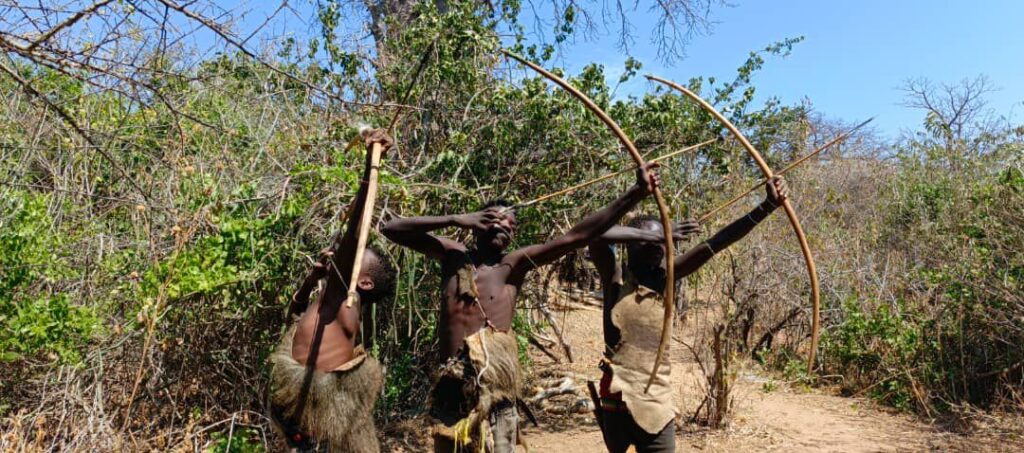Arusha. For generations Hadzabe – an indigenous tribe found in northern Tanzania – has survived habitat and other kinds of changes which have affected other parts of the country thanks to their persistence in using natural means to protect their environments.
Hadzabe are majorly found in area called Yaeda Chini in Karatu District in Arusha region in northern Tanzania. Yaeda is among areas which have managed to preserve its natural habitat, resisting climatic changes observed elsewhere. This is all thanks to Hadzabe communities which live in this area.
Hadzabe have helped this area preserved its natural habitat because of their way of living which look at environment as as one of sacred things which uphold their lives.
While climate change has been a reality in many parts of the world for years, it is only recently that Hadzabe have started to feel the pinch of climate change.
For many years Yaeda Chini was looked as few areas in Tanzania where natural habitat has survived the effects of climate change. This is because Hadzabe, who live in this areas are led by traditions which regard environment as sanctified.
Unique habits
Hadzabe respect the environment above all things because they know that their livelihood depend on it.
Hadzabe, who live as hunter and gatherers know that without forests they will have no game meat, tubers, roots and honey, which is their main food.
As a result it is a taboo for any Hadzabe to cut a tree or set fire on a bush. Trees are only cut for building homes.
Hadzabe consider even tilling the land as a practice which will deny them their livelihood so even agriculture is a practice which is alien to Hadzabe.
They continue to get their own traditional foods and develop their culture by using their traditional knowledge.
But things are changing rapidly and climate change is catching up with the Hadzabe. This is because of ‘invasion’ by outsiders in this secluded community.
Invasion by farmers and herders in Hadzabe natural habitats for farming, grazing and charcoal making, has made Hadzabe community susceptible to effects of climate change.
Though their main food is game meat but they dony kill animals randomly. When one family kill an animal usually several families will share the meat until it is finished before they go out to hunt for another animal.
When one family harvests honey, they will share it with their neighbours. Through this Hadzabe ensures preservation of their resources.

Society
The leader of the Hadzabe community from Qang’dend village in Karatu district, Ng’washambi Kusombi, says for many years they have been using natural knowledge to take care of the environment including managing water sources.
But now they are facing all kinds of threats from environmental degradation which have resulted in lack of food, among other issues facing their community currently.
“We have been living in the wild all the time and things were okay. But our areas have been invaded by herders and farmers from elsewhere and things have changed drastically,” he says.
He says activities by the herders and farmers are harmful to the environment which they have preserved for ages.
“They are cutting down trees, they are burning charcoal. They have brought their livestock and decimated our forests. Animals which we depended for food have all run away and the land has started to get barren,” he recounts adding:
“If we want to catch the animals we used to catch in we are forced to walk long distances to find them. Fruits and roots which we used to gather are no longer available. Farmers have cleared all the bushes which gave us food.”
He says that they had set aside areas for harvesting honey, especially from big gourd trees, but now they are told that the trees are not their property. The authorities have notified them of laws which put forests under the authority of the government.
“We never knew that forests around us belong to other people. All along we knew that this is our home and we own all that is around us,” he says.
Another resident of Qang’dend village, Juliana Yohana, says that in the past, wildlife was abundant in their localities because they (Hadzabe) used to take care of the land.
“Right now, not only our lives are in danger, even the lives of wildlife is also in danger. No one is safe here, wildlife, humans, even insects are in danger because of destruction of environment to pave way for agriculture,” says Juliana.
She says the situation has subjected women who are now have to walk long distances to find water and roots used for food and medicine while men hunt for game meat.
“We are asking the authorities to put a stop on environmental destruction. When you invade and destroy water source, you endanger the safety of women and children who may not have access to water for the whole day,” she says.
According to Juliana there are no health services in their locality and if someone falls sick they have to walk long distances to the hospital when in the past they are used to get roots for medicine in their area.
Another villager, Nyambulu Njegela, says the way they were living was a good catalyst for protecting the environment. Now that herders and farmers have invaded their areas things have changed.
“Under our tradition, when we hunt and kill an animal, we cannot hunt another one until we have finished the first one. But the new comers do not observe such habits,” he says.

Intervention
The Head of the Natural Resources and Environmental Conservation Division in Karatu Council, Donatha Kimaro, says that they have already begun to follow up on complaints of encroachment on the Hadzabe community’s areas and that they have prepared a plan for better use of the land. But, she says, they are facing the challenge of little understanding among some village leaders and citizens.
The Karatu district Forestry Officer, Reginald Hallu, says that the council has already started taking action against people who have encroached on Hadzabe land.
“We have warned such people that it is forbidden to invade the land reserved for the Hadzabe community. We continue to take action against all those who violate the regulation. We have arrested dome people and filled some cases against them. In some of the cases some people have been found guilty and they have paid fines, some cases are still going on,” says Hallu
Following the situation, the Media Aid for Indigenous and Pastoralists Community (MAIPAC) Director, Mussa Juma, says through funding from the Global Environment Facility (GEF), they have already visited the community to learn how they use natural knowledge to take care of the environment.
Juma says that they have noted that problems started when people who invaded the area started to disrespect the way the Hadzabe were living.
Given the situation they have started to compile the Hadzabe norms and traditions with the aim of writing a book which will help to educate many people.
Juma says their studies have established that Hadzabe community is in danger of disappearing, so it is important for the government to intervene.
“This community (the Hadzabes) does not engage in agriculture, they do not cut trees to make charcoal. They have been good environmentalists. The challenge in recent years is that many people have invaded their land from elsewhere and brought in ‘alien’ traditions,” he says.
Given the situation there is a need for concerted efforts by stakeholders, including the government, to come up with interventions which will save the Hadzabe.
And these efforts are worth as Hadzabe have proved over years that their traditional way of living can serve the environment.



Hi i am kavin, its my first time to commenting anyplace,
when i read this piece of writing i thought i could also make comment due to this sensible piece of writing.!
It is a pity, that now I can not express – it is very occupied. I will return – I will necessarily express the opinion.
——
estonia virtual number